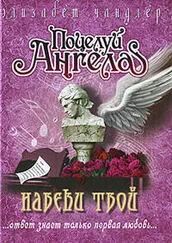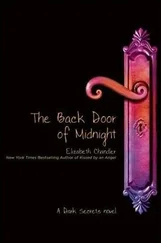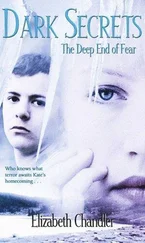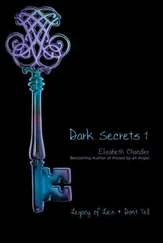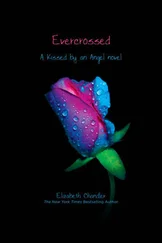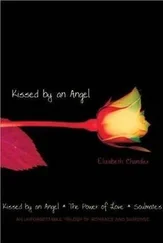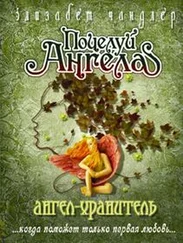Элизабет Чандлер - Don't Tell
Здесь есть возможность читать онлайн «Элизабет Чандлер - Don't Tell» весь текст электронной книги совершенно бесплатно (целиком полную версию без сокращений). В некоторых случаях можно слушать аудио, скачать через торрент в формате fb2 и присутствует краткое содержание. Жанр: Фэнтези, на английском языке. Описание произведения, (предисловие) а так же отзывы посетителей доступны на портале библиотеки ЛибКат.
- Название:Don't Tell
- Автор:
- Жанр:
- Год:неизвестен
- ISBN:нет данных
- Рейтинг книги:4 / 5. Голосов: 1
-
Избранное:Добавить в избранное
- Отзывы:
-
Ваша оценка:
- 80
- 1
- 2
- 3
- 4
- 5
Don't Tell: краткое содержание, описание и аннотация
Предлагаем к чтению аннотацию, описание, краткое содержание или предисловие (зависит от того, что написал сам автор книги «Don't Tell»). Если вы не нашли необходимую информацию о книге — напишите в комментариях, мы постараемся отыскать её.
Don't Tell — читать онлайн бесплатно полную книгу (весь текст) целиком
Ниже представлен текст книги, разбитый по страницам. Система сохранения места последней прочитанной страницы, позволяет с удобством читать онлайн бесплатно книгу «Don't Tell», без необходимости каждый раз заново искать на чём Вы остановились. Поставьте закладку, и сможете в любой момент перейти на страницу, на которой закончили чтение.
Интервал:
Закладка:
But it wasn’t my father who kept the police at bay the night my mother died and in the weeks following. Aunt Jule had argued fiercely with the sheriff and the state police, insisting the drowning was an accident, begging them for my sake not to stir up rumors with a pointless investigation.
Aunt Jule, whose long roots in this town gave her more clout than my father, had been my protector, and the house where my mother felt haunted, my refuge. The headlines made me cringe, but I had been taught that tabloids lied.
And I never stopped to wonder if my mother’s death was truly an accident or if Aunt Jule might have been protecting someone other than me.
I bounced my way over the potholes of Aunt Jule’s driveway, past her rusty Volvo, and thumped to a stop. From the driver’s seat I gazed up at the house, hoping it would look as I remembered. In most ways it did.
The long rectangular frame of the house was covered with gray clapboard. Its double set of porches, upper and lower, ran from end to end and a wood stairway led down from the upper porch. Along both porches there were doors rather than windows, each room having at least one exit to the outside. But unlike the pristine image I carried in my mind, the doors sagged with potbellied screens, and the paint was peeling badly. The river side of the house, which was identical to the garden side but exposed to the water, probably looked worse.
I climbed out of the car. The pungent smell of boxwood and the fragrance of roses surrounded me — just as I remembered! Between the house and myself were two big gardens, a square knot garden on the right, bristling with bushy hedges and herbs, and a flower garden on the left.
“Lauren! You’re here!” Aunt Jule cried out happily, stepping onto the lower porch. “Do you need help with your suitcase? Holly,” she called.
No matter what clothes Aunt Jule bought, she always seemed to be wearing the same outfit — a denim skirt or pants with a loose print top. Her long brown hair had streaks of gray in it now and fell in a thick braid down her back.
We met at the head of the path between the knot and flower gardens.
She threw her arms around me. “Hello, love. It’s good to have you back.”
“It’s good to be back,” I said, hugging her tightly.
“I’ve missed you.”
“And I’ve missed you.” I saw Holly emerging from the house. “But promise you won’t make a fuss over me.
When I was a little girl, my godmother would welcome me like visiting royalty and wait on me for the first few days.
Holly would get so mad she wouldn’t speak to me. It was only when Nora and Nick did, and she felt left out, that she would warm up and assume her usual position of ringleader.
Holly strode toward us, taller now than both her mother and I. Her shoulder-length hair was almost black, a glorious, shimmering color that contrasted sharply with her blue eyes.
She had the beautiful eyes and brows of an actress, the kind that caught your attention with their drama and careful shaping.
“You look great!” I said.
She hugged me. “You, too. Welcome back, Lauren. I was so excited when Mom said you were coming. Is there something I can carry?”
I opened the trunk of my car, took out a full-size suitcase, and handed her an overnight bag.
Aunt Jule hovered close by and touched the smaller bag’s soft leather. “How nice!” she said. “You should get one of these, Holly.”
“Right, Mom. Shall we put it on our credit card? Come inside, Lauren. You must be thirsty,” Holly said, starting up the path.
“Oh, Lord!” Aunt Jule’s hand flew up to her forehead. “I forgot to check what we have to drink. There could be—”
“Iced tea or lemonade,” Holly told me, smiling. “I made a pitcher of each. Which would you like?”
“Iced tea, please.”
My godmother and I followed Holly into the house, entering the back of a wide hall that ran from the garden side to the river side of the house. We set my bags at the foot of the stairs and turned right, into the dining room.
It looked exactly as I remembered — a collection of dark wood chairs scattered around a long table that was buried beneath mail, magazines, and baskets of Aunt Jule’s craft stuff. The mahogany table might have been a valuable antique, but it was badly scarred by years of water rings and the grind of game pieces into its surface. One reason I had loved to come here was that, unlike my parents’ elegant town house, it was almost impossible to “ruin” something.
In the kitchen Holly set four glasses on a tray and began to pour the tea.
“Where’s Nora?” I asked.
“She’ll come around sooner or later,” Aunt Jule replied casually.
Holly glanced sharply at her mother. “I assume you told Lauren about Nora.”
“Not yet. Lauren has just arrived.”
“You should have told her before.”
“I saw no point in saying anything until she came,” Aunt Jule replied coolly, then smiled at me. “Garden room or river room?”
“Garden.”
Holly picked up the tray. “Don’t forget to turn out the light, Mom.”
“Forget? How can 1, with you always reminding me?”
“I don’t know, but somehow you do.”
As we left the kitchen I peeked at Holly, wondering what I was supposed to be told about Nora. She had not been the most normal of kids.
We passed through the hall again and entered the garden room. Aunt Jule’s house was built in the early 1900s on the foundation of a much older one that had burned down.
Intended as a summer home, it was designed for airiness.
The dining room and kitchen lay on one side of the stairs and, together with the steps and hall, occupied a third of the space downstairs. On the other side of the hall were two long rectangular rooms, each with two sets of double porch doors, those in one room facing the garden, those in the other facing the river. Two wide doorways connected these rooms, allowing the breeze to blow through the house.
At Aunt Jule’s you never felt far from the Sycamore River.
Each time I took a breath I noticed the mustiness that shore homes seem to have in their bones. And I knew I still wasn’t ready to face the dock where my mother had struck her head, or the water below it, where she had drowned.
We had just settled down in the garden room with its two lumpy sofas and assortment of stuffed chairs when Nora entered from the porch. I was startled at what I saw.
“Nora, dear, Lauren has arrived,” Aunt Jule said.
Nora stood silently and stared at me. Her thin, black hair was pulled straight back in an old plastic headband and hung in short, oily pieces. Her dark eyes were troubled. The slight frown she wore as a child had deepened into a single, vertical crease between her eyebrows, a line of anger or worry that couldn’t be erased.
“Please say hello, Nora,” Aunt Jule coaxed softly.
Nora acted as if she hadn’t heard. She crossed the room to a table on which sat a vase of roses. She began to rearrange the flowers, her mouth set in a grim line.
“Hi, Nora. It’s good to see you,” I said.
She pricked her finger on a thorn and pulled her hand away quickly.
“It’s good to see you again,” I told her.
This time she met my eyes. Locking her gaze on mine, she reached for the rose stem and pricked her finger deliberately, repeatedly.
Her strange behavior did not seem to faze anyone else.
Holly leaned forward in her chair, blocking my view of Nora.
“So, did my mother think to tell you I’m graduating?”
“Uh, yes,” I replied, turning my attention to her. “It’s this coming Thursday, right? She said this was Senior Week for you. Are kids getting all weepy about saying goodbye?”
Читать дальшеИнтервал:
Закладка:
Похожие книги на «Don't Tell»
Представляем Вашему вниманию похожие книги на «Don't Tell» списком для выбора. Мы отобрали схожую по названию и смыслу литературу в надежде предоставить читателям больше вариантов отыскать новые, интересные, ещё непрочитанные произведения.
Обсуждение, отзывы о книге «Don't Tell» и просто собственные мнения читателей. Оставьте ваши комментарии, напишите, что Вы думаете о произведении, его смысле или главных героях. Укажите что конкретно понравилось, а что нет, и почему Вы так считаете.


